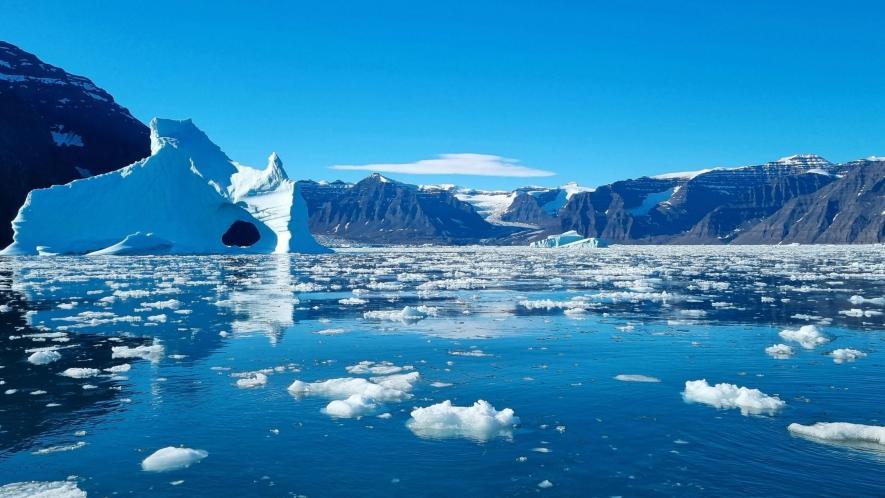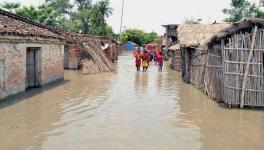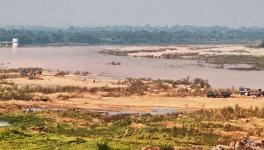COP29: HKH Countries Pledge to Strengthen Ties to Tackle Climate Crisis in Mountains

Melting ice. (Representational photo)
Patna: With global warming threatening the earth’s tallest cryosphere zone, the leaders of the Hindu Kush Himalaya (HKH) countries have pledged to strengthen ties to tackle climate crisis in mountains region at the 29th Conference of Parties (COP29) to the United Nations Framework Convention on Climate Change in Baku, Azerbaijan.
After scientists and experts at COP29 warned of ‘extreme’ and mounting economic costs from snow and ice loss, which broke records in 2023, the leaders from the HKH countries discussed the crisis in the continent’s largest frozen water stores, the HKH.
The ministers and heads of delegations from six of the eight countries of HKH that share the earth’s tallest cryosphere zone met at a meeting hosted by Bhutan’s Prime Minister Tshering Tobgay on day two of COP29 summit, according to an official release by the Kathmandu-based International Centre for Integrated Mountain Development (ICIMOD) from Baku.
Tobgay said “The HKH region – this biodiversity hotspot to the world – a repository of some of the world’s biggest amounts of ice – this water tower that supports almost 2 billion people, is at risk,” adding that “We are vulnerable, and the effects of climate change are already affecting our entire
region.”
He said the “fact that our fast ascending towards 1.5 degree celsius will accelerate disasters for the entire region, 240 million people in HKH and 1.6 billion live downstream. We need to do more. We need to come together with a unified source of vision, with one voice and call for action.”
Naresh Pal Gangwar, joint secretary, Ministry of Environment and Forest and Climate Change, India, highlighted air pollution as a pressing, shared challenge within the Indo-
Gangetic Airshed.
“Most of our countries fall under the same air-shed, i.e., the Indo-Gangetic Airshed. This is a transboundary issue. All countries must work together to address air pollution,” he said, urging countries, particularly Pakistan and Bangladesh, to take proactive, collaborative steps to manage and mitigate air pollution across borders.
Nepal’s Ain Bahadur Shahi Thakuri shared urgent reminders of climate vulnerability, noting the recent devastating Thame flood that swept away an entire village and the September floods that claimed over 150 lives. He called for solidarity in the fight against climate change and urged everyone to work toward a global partnership.
Romina Khursheed Alam, Coordinator to Prime Minister for the Ministry of Climate Change & Environmental Coordination, Pakistan, also called for unity, stating, “As we gather here in Baku, let us unite to protect the invaluable resources of the HKH region through strengthened cooperation, targeted investments and mobilisation of international support, we can foster a sustainable resilient future for the HKH region because it’s not you, it’s not me. It is us.”
Farhina Ahmad, Secretary, Ministry of Environment, Forest and Climate Change, Bangladesh, stressed that climate crisis was impacting not only their own country but the entire
region.
“Not only Bangladesh, but the whole region is suffering. It is immeasurable. And if we remain and do our business as usual, the problem will get severe. We should act to prevent the ongoing loss,” she stated.
Bangladesh reaffirmed their commitment to raising these issues, both in regional dialogues and through national platforms, to advocate for the Hindu Kush Himalaya region.
ICIMOD’s director general Pema Gyamtsho said: “Yet again, across this region this year, families have been mourning their dead, counting lost land, livelihoods, and heritage, or facing up to the agonising dilemma, of whether to stay in mountain towns and villages, and try to adapt to hugely uncertain conditions, or abandon homes and sever ties with landscapes to which their communities have been entwined for millennia.”
He called for addressing “this escalating crisis” by prioritising disaster preparedness, boosting adaptation financing and target it where it matters most, pursuing “the win-win potential of tackling air pollution, drive new investments, quantify economic costs to advocate effectively for loss and damage finance, and support stronger policy coordination.”
Karma Tshering, Bhutan’s secretary of the Ministry of Energy and Natural Resources, presented the need to strengthen regional cooperation on several issues of common concerns and interests including cryosphere risk monitoring, disaster preparedness and early warning systems, including resilient infrastructures, air pollution, biodiversity conservation along with building capacity of the region to access funding from global funds such as Adaptation fund, GEF and GCF, innovative financing solutions, coordination and support at global forums like COPs to represent and amplify common HKH issues and concerns.
Most importantly, he emphasised the need to have a biennial ministers’ meeting as agreed in the 2020 Ministerial Mountain Summit.
The writer is a freelance journalist based in Patna, Bihar.
Get the latest reports & analysis with people's perspective on Protests, movements & deep analytical videos, discussions of the current affairs in your Telegram app. Subscribe to NewsClick's Telegram channel & get Real-Time updates on stories, as they get published on our website.























